Text
Icelandic Vocab 14 - writing letter
Icelandic - English
Elsku Jón - Dear John
Ferðalagið var frábært - My trip was very nice
Menningin og fólkið voru mjög áhugaverð - The culture and people were very interesting
Ég skemmti mér vel með þér - I had a good time with you
Ég vil endilega koma aftur til lands þíns - I would love to visit your country again
Ekki gleyma að skrifa mér tilbaka annað slagið - Don't forget to write me back from time to time
26 notes
·
View notes
Text
Four cool family words in Icelandic
mæðgur (fpl) - mother and daughter
mæðgin (npl) - mother and son
feðgar (mpl) - father and son
feðgin (npl) - father and daughter
24 notes
·
View notes
Text
Icelandic grammatical cases | Pancake
That’s a very good pancake. // Það er mjög góð pönnukaka. // nom, sing, indef.
Which stuffed pancake did you like best? // Hvaða fylltu pönnuköku fannst þér best? // acc, sing, indef.
My brain feels like a pancake. // Heilanum minn líður eins og pönnuköku. // dat, sing, indef.
Don’t touch my pancake! // Ekki snertu pönnuköku minnar! // gen, sing, indef.
Her first pancake didn’t turn out that good. // Fyrsta pönnukakan hennar gafst ekki mjög vel. // nom, sing, def.
There are no fruits left for the last pancake. // Engir ávextir eru eftir fyrir síðustu pönnukökuna. // acc, sing, def.
It’s almost time to turn the pancake over. // Það er næstum kominn tími til að snúa pönnukökunni við. // dat, sing, def.
And now put the filling on the other half of the pancake. // Og settu nú fyllinguna á annan helming pönnukökunnar. // gen, sing, def.
Rolled pancakes look so cute! // Upprúllaðar pönnukökur líta svo krúttlega út! // nom, pl, indef.
He’s going to bake pancakes. // Hann ætlar að baka pönnukökur. // acc, pl, indef.
She gave them a big plate of pancakes. // Hún gaf þeim stóran disk af pönnukökum. // dat, pl, indef.
Have you ever lost a cookie among pancakes? // Hefurðú nokkurn tíma týnt smáköku meðal pönnukaka? // gen, pl, indef.
The pancakes aren’t ready yet. // Pönnukökurnar eru ekki tilbúnar ennþá. // nom, pl, def.
Do you want me to pour some syrup on your pancakes? // Viltu að ég helli sírópi á pönnukökurnar þínar? // acc, pl, def.
There are lots of desserts, but let’s start with the pancakes. // Það er til fullt af eftirréttum, en við skulum byrja á pönnukökunum. // dat, pl, def.
Place the filling between the pancakes. // Setjið fyllinguna á milli pönnukakanna. // gen, pl, def.
31 notes
·
View notes
Text
Icelandic Vocab 13 - Romanic phrases
Icelandic - English
Rómantík - Romance
Ertu laus annað kvöld? - Are you free tomorrow evening?
Mig langar til að bjóða þér til kvöldverðar - I would like to invite you to dinner
Þú ert falleg - You look beautiful! (to a woman)
Nafnið þitt er fallegt - You have a beautiful name
Segðu mér meira frá sjálfri þér - Can you tell me more about you?
Ertu gift? - Are you married?
Ég er einhleypur - I'm single
Ég er giftur - I'm married
Má ég fá símann hjá þér? - Can I have your phone number?
Má ég fá netfangið þitt? - Can I have your email?
Áttu einhverjar myndir af þér? - Do you have any pictures of you?
Áttu börn? - Do you have children?
Viltu koma í gönguferð? - Would you like to go for a walk?
Ég kann vel við þig - I like you
Ég elska þig - I love you
Þú ert afar sérstök - You're very special!
Þú ert afar vinsamleg - You're very kind!
Ég er afar hamingjusamur - I'm very happy
Viltu gitftast mér - Would you marry me?
Ég er að grínast - I'm just kidding
Mér er alvara - I'm serious
Hjarta mitt talar máli ástarinnar - My heart speaks the language of love
Þetta er kona mín - This is my wife
Þetta er maðurinn minn - This is my husband
#icelandic#icelandic langblr#iceland#icelandic to english#icelandic language#icelandic vocab#icelandic vocabulary#langblr
13 notes
·
View notes
Text
Icelandic Vocab 12 - Polite Cuss words
Icelandic - English
Þetta er vitleysa - This is nonsense! (or: this is craziness)
Guð! - My God! (to show amazement)
Vá! - Oh gosh! (when making a mistake)
Þetta er glatað! - It sucks! (or: this is not good)
Hvað er að þér? - What's wrong with you?
Ertu ruglaður! - Are you crazy?
Drullaðu þér í burtu! - Get lost! (or: go away!)
Láttu mig vera! - Leave me alone!
Ég hef engan áhuga - I'm not interested!
#icelandic langblr#iceland#icelandic#icelandic language#icelandic vocabulary#icelandic vocab#icelandic to english#langblur#language#nordic language
12 notes
·
View notes
Text
Icelandic Vocab 11 - Emergency
Icelandic - English
Neyðar- og lífsbjargarfrasar - Emergency Survival Phrases
Hjálp! - Help!
Stopp! - Stop!
Eldur! - Fire!
Þjófur! - Thief!
Hlauptu! - Run!
Passaðu þig! - Watch out! (or: be alert!)
Hringdu á lögregluna! - Call the police!
Hringdu á lækni! - Call a doctor!
Hringdu í sjúkrabíl! - Call the ambulance!
Er allt í lagi með þig? - Are you okay?
Mér líður ekki vel - I feel sick
Ég þarfnast læknis- I need a doctor
Slys - Accident
Matareitrun - Food poisoning
Hvar er næsta apótek? - Where is the closest pharmacy?
Mér er illt hérna - It hurts here
Það er áríðandi! - It's urgent!
Róaðu þig niður - Calm down!
Þetta verður allt í lagi! - You will be okay!
Geturðu hjálpað mér? - You will be okay!
Get ég hjálpað þér? - Can I help you?
#icelandic langblr#icelandic#iceland#icelandic language#nordic language#icelandic vocab#icelandic vocabulary#langblr#vocabulary#vocab
5 notes
·
View notes
Text
Icelandic Vocab 10 - Asking for directions
Icelandic - english
Að biðja um hjálp og leiðbeiningar - Asking for Directions
Afsakið mig! - Excuse me! (before asking someone)
Ég er týndur/týnd - I'm lost
Geturðu hjálpað mér? - Can you help me?
Get ég hjálpað þér? - Can I help you?
Ég er ekki héðan - I'm not from here
Hvernig kemst ég hingað? - How can I get to (this place, this city)?
Farðu beint áfram - Go straight
Svo - Then
beygirðu til vinstri - Turn left
beygirðu til hægri - Turn right
Geturðu sýnt mér? - Can you show me?
Ég get sýnt þér! - I can show you!
Komdu með mér! - Come with me!
Hvað tekur langan tíma að komast þangað? - How long does it take to get there?
Miðbær - city center
Hann er ekki langt frá - It's near here
Hann er langt frá - It's far from here
Er hann í göngufæri? - Is it within walking distance?
Ég er að leita að (Name) - I'm looking for (name)
Augnablik! - One moment please!
Hinkraðu aðeins! - Hold on please! (when on the phone)
Hann er ekki við - He is not here
Flugvöllur - Airport
Strætóstöð - Bus station
Lestarstöð - Train station
Leigubíll - Taxi
Nálægt - Near
Langt frá - Far
#iceland#icelandic#icelandic langblr#icelandic language#icelandic vocab#icelandic vocabulary#langblr#nordic language#language#vocabulary
5 notes
·
View notes
Text
Icelandic Vocab 9 - Solving misunderstanding
Icelandic - english
Að leysa misskilning - Solving a Misunderstanding
Afsakið! - Sorry! (or: I beg your pardon!)
Fyrirgefðu - Sorry (for a mistake)
Ekkert mál! - No problem!
Geturðu endurtekið? - Can you repeat please?
Geturðu talað hægar? - Can you speak slowly?
Geturðu skrifað það niður? - Can you write it down?
Skilurðu hvað ég sagði? - Did you understand what I said?
Ég skil ekki! - I don't understand!
Ég veit það ekki! - I don't know!
Hvað kallast þetta á íslensku? - What's that called in Icelandic?
Hvað þýðir þetta orð á ensku? - What does that word mean in English?
Hvernig segi ég (English word) á íslensku? - How do you say (English word) in Icelandic?
Hvað er þetta? - What is this?
Hafðu ekki áhyggjur! - Don't worry!
Ég er sammála þér - I agree with you
Er það rétt? - Is that right?
Er það rangt? - Is that wrong?
Hvað á ég að segja? - What should I say?
Ég þarf bara að æfa mig - I just need to practice
#iceland#icelandic#icelandic langblr#icelandic language#icelandic to english#icelandic vocab#icelandic vocabulary#langblr#language#nordic language
60 notes
·
View notes
Text
Icelandic Vocab 8 - Daily expressions
Icelandic - english
Frasar af handahófi - Daily Expressions
Hvað er klukkan? - What time is it?
It's 3 o'clock Hún er þrjú
Komdu með þetta! - Give me this!
Ertu viss? - Are you sure?
Gjörðu svo vel! - Take this! (when giving something)
Kanntu vel við það? - Do you like it?
Ég kann mjög vel við það - I really like it!
Ég er svangur - I'm hungry
Ég er þyrstur - I'm thirsty
Hann er fyndinn - He is funny
Á morgnana - In The Morning
Á kvöldin - In the evening
Að nóttu - At Night
Flýttu þér! - Hurry up!
About the weather
Það er skítkalt - It's freezing
Það er kalt - It's cold
Það er heitt - It's hot
#icelandic#iceland#icelandic langblr#icelandic language#icelandic vocab#icelandic vocabulary#nordic language#langblr#language#vocabulary#icelandic to english#vocab
41 notes
·
View notes
Text
Icelandic Vocab 7 - essential words
Icelandic - English
Stuttir frasar og orð - Short Expressions and words
Gott - good
Slæmt – bad
La-la – so-so/not so bad
Stórt - big
Lítið – small
Í dag – today
Núna - now
Á morgun – tomorrow
Í gær - Yesterday
Já – yes
Nei – no
Hratt – fast
Hægt – slow
Heitt – hot
Kalt – cold
Þetta – this
Þetta – that
Hérna – here
Þarna – there
Ég – me (ie. Who did this? - Me)
Þú – you
Hann – him
Hún – her
Við – us
Þau – them
Í alvöru? - Really?
Sjáðu! - Look!
Hvað? - What?
Hvar? - Where?
Hver? - Who?
Hvernig? – how?
Hvenær? – When?
Hvers vegna? – Why?
#icelandic langblr#iceland#icelandic#icelandic language#icelandic vocab#icelandic vocabulary#vocabulary#icelandic to english#langblr#language#nordic language
16 notes
·
View notes
Text
Icelandic Vocab 6 - Countries & Languages
List of countries and languages - not complete
Icelandic to English
Lönd - Countries
Ísland - Iceland
Ástralía - Countries
Kambódía - Cambodia
Kanada - Canada
Kína - China
Egyptaland - Egypt
England - England
Frakkland - France
Þýskaland - Germany
Grikkland - Greece
Indland - India
Indónesía - Indonesia
Ítalía - Italy
Japan - Japan
Mexíkó - Mexico
Marokkó - Morocco
Perú - Peru
Spánn - Spain
Taíland - Thailand
Bandaríkin - USA
Tungumál - Languages
Íslenska- Icelandic
Arabíska - Arabic
Kínverska - Chinese
Enska - English
Franska - French
Þýska - German
Gríska - Greek
Hebreska - Hebrew
Hindú - Hindi
Ítalska – italian
Japanska - Japanese
Kóreska - Korean
Latína - Latin
Rússneska - Russian
Spænska - Spanish
Urdú - Urdu
Víetnömska - Vietnamese
Mongólska - Mongolian
#icelandic langblr#iceland#icelandic#icelandic language#nordic language#language#langblr#icelandic vocab#icelandic vocabulary#icelandic to english
14 notes
·
View notes
Text
Icelandic Vocab 5 - polite conversations
Icelandic - english
Að kynna þig - How to Introduce Yourself
Hvað heitirðu? - How to Introduce Yourself
Ég heiti (Jón Jónsson) - My name is (John Doe)
Gaman að hitta þig! - Nice to meet you!
Hvaðan ertu? Where are you from?
Ég er frá (country) – I am from (country)
Bandaríkjunum – The USA
Íslandi - Iceland
Ég er (nationality) – I am (Nationality)
Bandaríkjamaður – American
Íslendingur - Icelandic
Hvar áttu heima? - Where do you live?
Ég bý í Bandaríkjunum – I live in the U.S.A
Ég bý á Íslandi - I live in Iceland
Kanntu vel við þig hér? - Do you like it here? (in Iceland)
Ísland er fallegt land - Iceland is a beautiful country
Hvað gerirðu? - What do you do for a living?
Ég er (Job) - I'm a (Job)
Kennari - Teacher
Námsmaður - Student
Verkfræðingur - engineer
Talarðu ensku – Do you speak English?
Hvað ertu gamall/gömul - How old are you?
Ég er (number) ára - I'm (number) years old
phrases to help explain Icelandic abilities when interacting
Talarðu íslensku – Do you speak Icelandic?
Bara lítið - Just a little
Ég kann vel við íslensku - I like Icelandic
Ég er að reyna að læra íslensku - I'm trying to learn Icelandic
Það er erfitt tungumál - It's a hard language
Það er auðvelt tungumál - It's an easy language
Ó! Það er gott! - Oh! That's good!
Get ég æft mig á þér? - Can I practice with you?
Ég reyni mitt besta til að læra (tungumálið) - I will try my best to learn
Það var gaman að tala við þig! - It was nice talking to you!
#iceland#icelandic#icelandic langblr#icelandic language#nordic language#language#langblr#icelandic vocab#icelandic vocabulary#vocab#icelandic to english
13 notes
·
View notes
Text
Icelandic Vocab 4 - counting numbers
Icelandic - English
númer – numbers
einn – one - 1
tveir – two - 2
þrír – three - 3
fjórir – four - 4
fimm – five - 5
sex – six - 6
sjö – seven -7
átta – eight - 8
níu – nine - 9
tíu – ten - 10
ellefu – eleven - 11
tólf – twelve - 12
þrettán – thirteen - 13
fjórtán – fourteen - 14
fimmtán – fifteen -15
sextán – sixteen - 16
Sautján seventeen - 17
Átján – eighteen - 18
Nítján – nineteen - 19
Tuttugu – twenty – 20
þrjátíu - thirty - 30
fjörutíu - forty - 40
fimmtíu - fifty- 50
sextugur - sixty – 60
sjötíu - seventy – 70
áttatíu - eighty – 80
níutíu - ninety – 90
Hundrað – hundered - 100
eitt þúsund - one thousand -1000
þúsund - thousand - 1000
milljón – million – 1,000,000
From 21 and up, numbers are formed by adding the units on the end of the tens.
tuttugu og eins - twenty one - 21
þrjátíu og tveir – thirty two – 32
Tens og unit
The first four numbers in Icelandic are declined like nouns, in gender and case.
Masculin - Feminine - neutral - number in English
Einn - ein - eitt - One
Tveir - tvær - tvö - two.
Þrír - þrjár - þrjú - three
Fjórir - fjórar - fjögur - four
#icelandic language#icelandic#icelandic langblr#iceland#icelandic vocab#icelandic vocabulary#language#langblr#language vocabulary
12 notes
·
View notes
Text
Icelandic Vocab 3 - Special Greetings
holiday and special greetings
Icelandic - English
Þegar maður óskar einhverjum einhvers - Holidays and Wishes
Gangi þér vel! - Good luck!
Til hamingju með afmælið - Happy birthday!
Gleðilegt nýtt ár! - Happy new year!
Gleðileg jól! - Merry Christmas!
Gleðilega páska - Happy Easter
Gleðilegan þjóðhátíðardag - Happy Independence Day
Til hamingju! - Congratulations!
Verði ykkur að góðu! - Enjoy! (or: bon appetit)
Guð hjálpi þér - Bless you (when sneezing)
Til hamingju - Best wishes!
Skál! - Cheers!
Silaði kveðju frá mér - Accept my best wishes
#icelandic language#icelandic langblr#iceland#icelandic#icelandic vocabulary#nordic language#langblr#language#vocabulary#icelandic vocab#icelandic to english
20 notes
·
View notes
Text
Icelandic Vocab 2 - greetings
More detailed list of Icelandic greetings and polite conversation
Icelandic - English
Greeting - Kveðjur
Hæ! – Hi
Góðan dag! – good dady/ good morning
Gott kvöld! - Good evening!
Velkomin! - Welcome! (to greet someone)
Sæll kæri vinur! - Hello my friend!
Hvað segirðu? - How are you? (friendly)
Hvernig hefurðu það? - How are you? (polite)
Response to how are you
Mjög gott, takk! - I'm fine, thank you!
En þú? - And you?
Gott – Good
Ágætt - Not so good
Langt síðan ég hef séð þig - Long time no see
Ég hef saknað þín - I missed you
Er eitthvað í fréttum? - What's new? –
Ekkert nýtt - Nothing new (response to what new)
Gratitude
Takk þér - Thank you (very much)!
Takk þér kærlega fyri - thank you very much!
Ekkert að þakka! - You're welcome! (response to thank you)
Mín var ánægjan - My pleasure
Kom inn! - Come in!
Láttu eins og heima hjá þér! - Make yourself at home!
Kveðjur - Farewell Expressions
Hafðu það gott! - Have a nice day!
Góða nótt! - Good Night
Góða nótt og dreymi þig vel! - Good night and sweet dreams!
Sjáumst síðar! - See you later!
Sjáumst! - See you soon!
Sé þig á morgun - See you tomorrow!
Bless! - Good bye!
Góða ferð! - Have a good trip!
Ég verða að fara - I have to go
Kem að vörmu spo - I will be right back!
#icelandic#iceland#icelandic langblr#icelandic language#icelandic vocabulary#language#langblr#nordic language#vocabulary#icelandic vocab#icelandic to english
7 notes
·
View notes
Photo
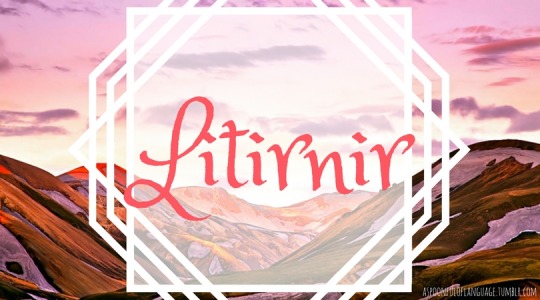

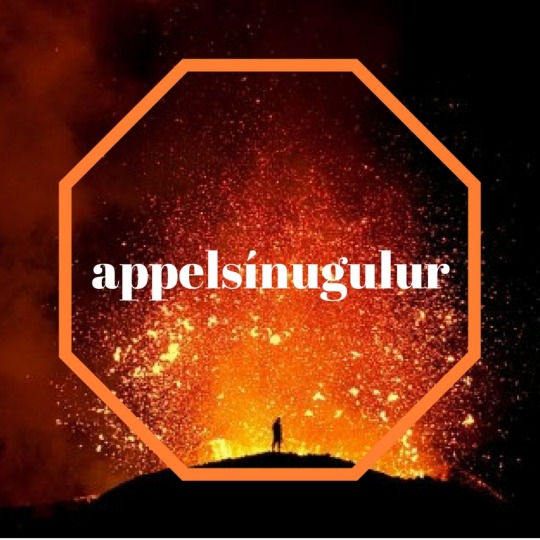

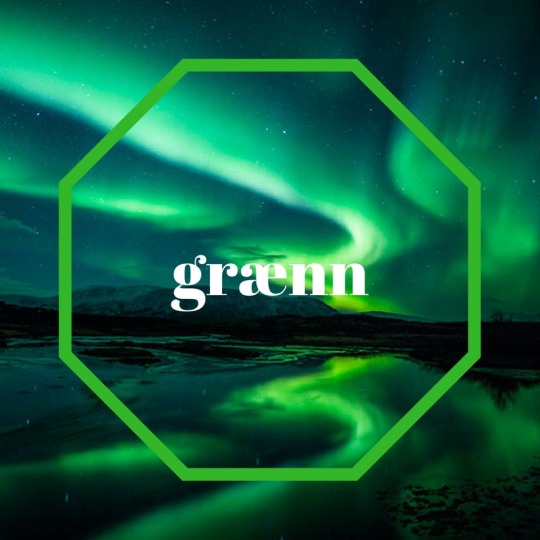
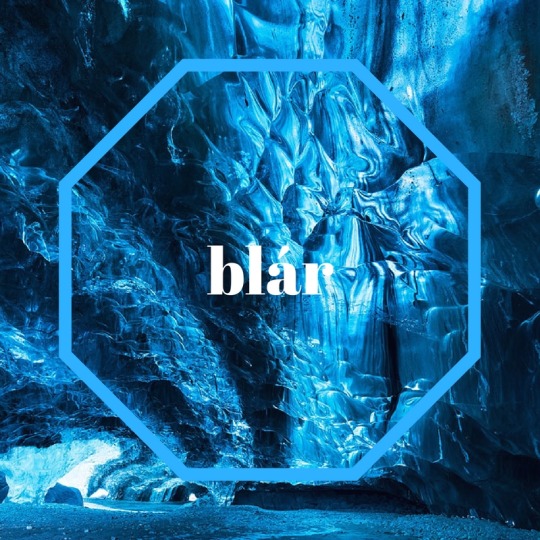
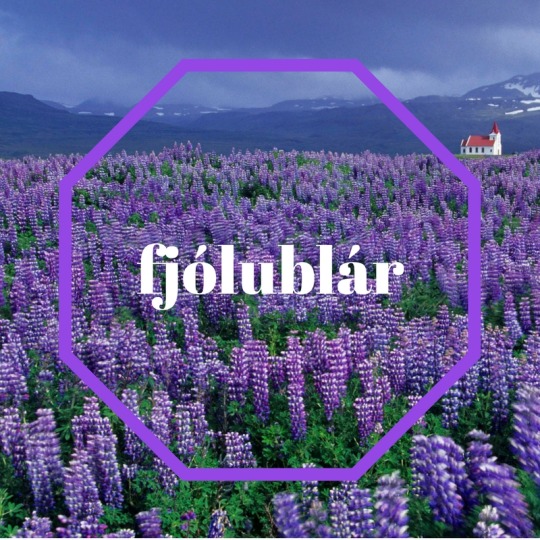
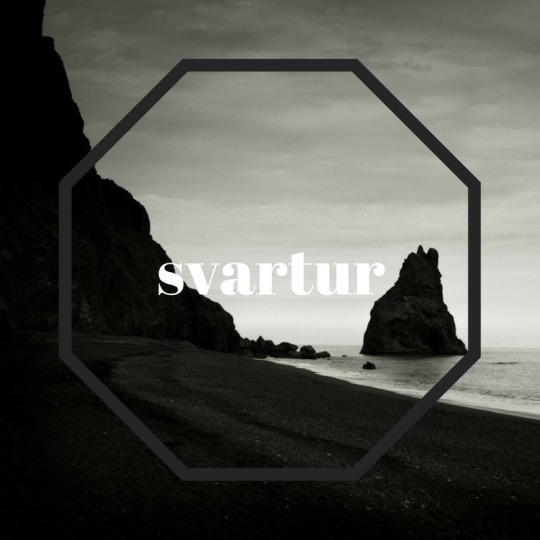

Yay another colours vocab list! This time, it’s in Icelandic. As always, if there are any mistakes please let me know. I hope you enjoy :)
Note: All of the cards were made by yours truly, but all of the background images were found on Google. If an image is yours and you would like me to remove it, just send me a message.
449 notes
·
View notes
Text
Why Icelandic is Easy to Learn
There seems to be this idea out there that the Icelandic language is an incredibly difficult language for English speakers to learn, so when I first started studying it I was a bit nervous. However, although I still haven’t been studying it for very long, I’ve yet to run across anything that’s scared me off, and quite a bit that actually makes it quite easy to pick up as a native English speaker. So to cast off some of the stigma, here are some things that make Icelandic easy to learn (or at least not as horrifying as I’d been led to believe):
Spelling is very consistent. Icelandic spelling is mostly phonetic, where each letter represents only one sound. While there are a few instances where letters aren’t pronounced exactly the same, the variations are regular so you can learn when they’re said differently instead of just having to guess, and over time they will become natural with practice. French is supposed to be relatively easy for English speakers to learn due to shared vocabulary, but Icelandic beats French hands down in this area.
Most of the sounds are similar to English. Many of the letters are pronounced basically just like English, and while it might look a little intimidating with all the extra vowels with accent marks and so on, most of those are sounds we actually have in English, they just represent them explicitly in Icelandic, which actually helps with the point about spelling above. Here is a great video that very clearly explains the Icelandic alphabet, and as you can see, out of the 14 vowels/diphthongs there are only 3 that aren’t in English. So sure, there are some sounds that aren’t in English, but that’s going to happen in almost any language, and Icelandic doesn’t seem to be any worse in this area than German, for example. In fact, if you know both German and English, you’re pretty much set when it comes to Icelandic phonemes.
The stress is always the same. In Icelandic words are always pronounced with the stress on the first syllable. In Spanish, for example, the stress changes based on which letters a word ends with and whether or not there are any accent marks, so you have to learn those rules and then memorize each exception so you know where to put the accent, and it can be a little tricky. In Icelandic there is only one rule that never changes, making it super simple.
There are only four cases. Okay, if you’ve never studied a language with cases before, having any at all can be a bit daunting coming from English since we don’t really use them much, but if you’re going to learn a language with cases only having four is pretty great! It’s the same number of cases as German has, and waaay better than Slavic languages that can have six or seven, and there are other languages which have even more.
There are only three new characters to learn. A lot of people seem to be intimidated by the special characters Ðð, Þþ, and Ææ, but if you compare those three measly characters to languages like Greek, Russian, Arabic, or even Japanese – which has two separate syllabaries on top of thousands of kanji to learn – you can see how it’s nothing at all. Best of all, those characters represent sounds that already exist in English, so you can easily learn how to pronounce them. Ð is pronounced as the ‘th’ in ‘breathe’, Þ as the ‘th’ in ‘breath’, and æ as the ‘i’ in ‘hi’. In fact, if you want to say “Hi!” in Icelandic it’s exactly the same: “Hæ!” Similarly, “Bye!” is “Bæ!” You can see too how the spelling here is consistent in Icelandic, using only one character to represent the same sound, while in English we use ‘i’ in one word and ‘ye’ in the other, and in other words we might use even more spellings for the same sound, such as ‘ai’ or ‘y’, or even ‘igh’ (like in ‘sigh’). So even though you do have to learn a few new characters, it’s hardly any, and once you’ve learned them it actually makes Icelandic much easier to read and spell than it would be without them.
A lot of vocab comes from the same Germanic roots as English words. While English has borrowed a bunch of vocab from Latin languages, it still contains many words that come from its Germanic origins, which it shares with Icelandic. You’ve already seen hæ and bæ, and there’s also halló (hello), dóttir (daughter), móðir (mother), hér (here), frá (from), takk (thanks), heitt (hot), kalt (cold), hjálp (help), fiskur (fish), nót (net), undir (under), mús (mouse), and many more.
Basic grammar is very similar to English. Like I’ve said, I haven’t been studying long so I’m sure there’s more complicated stuff coming up, but in the basics I’ve run across so far the word order is so similar to English that you can pretty much take an English sentence and switch out the English words for their Icelandic versions and have a correct sentence. Some examples:
I am…
Ég er…
You are…
Þú ert…
I am from Canada.
Ég er frá Kanada.
Are you from Iceland?
Ert þú frá Íslandi?
I am not from Spain.
Ég er ekki frá Spáni.
They come from Japan.
Þau koma frá Japan.
I don’t know about you, but the above doesn’t seem so difficult to me. Even if you haven’t learned the pronunciation yet, the grammatical structure is very familiar and many of the words look similar to their English counterparts.
Of course there are difficult things about Icelandic, but there are difficult things about every language. Icelandic is certainly not an impossible language to learn, and there are many things about it that are actually quite simple compared to other languages, or at the very least not any worse. If you’ve considered learning Icelandic, but were hesitant after hearing how terribly difficult it supposedly is, maybe this will show that it doesn’t have to be so scary after all.
3K notes
·
View notes